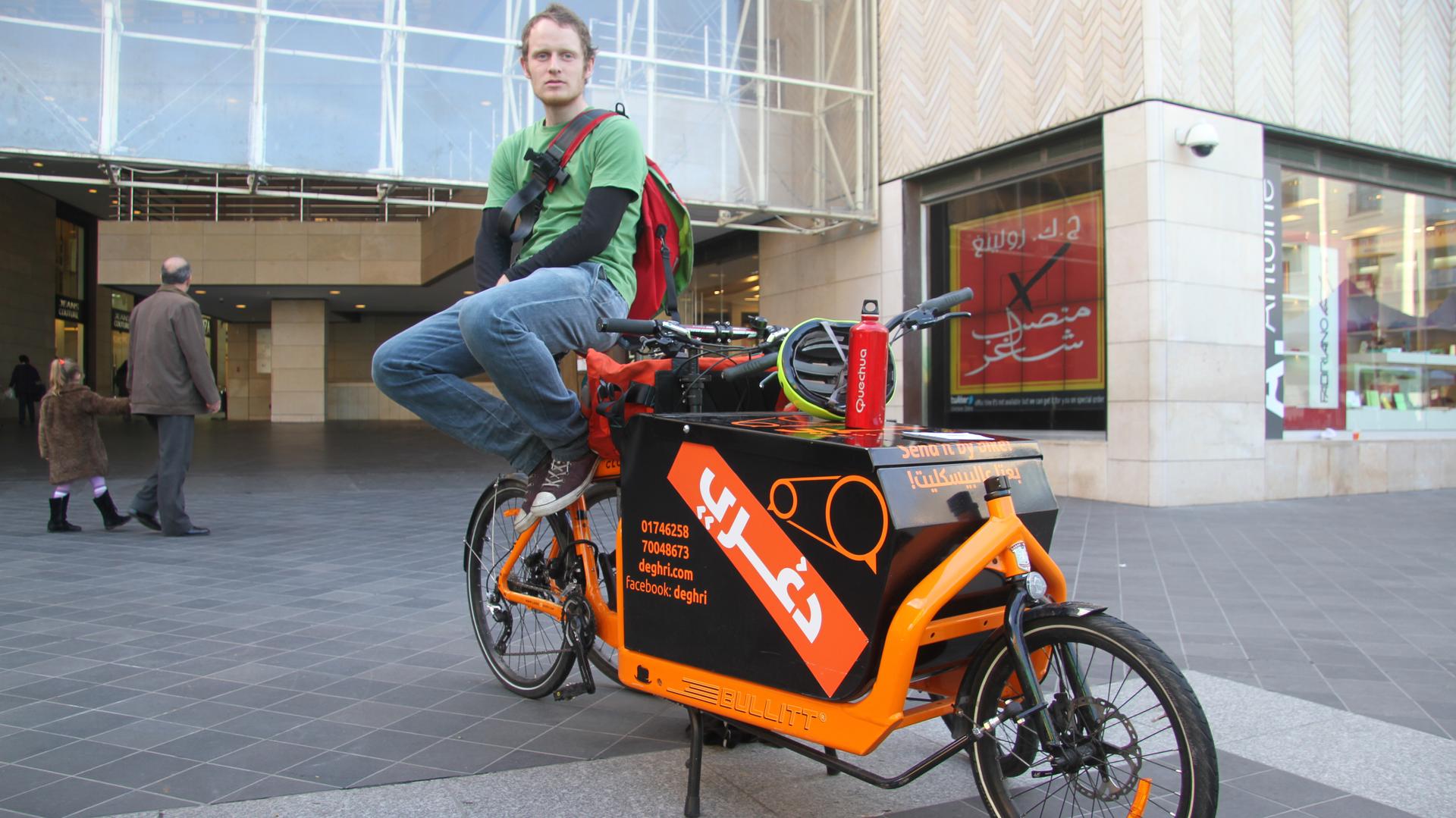For a bike messenger, Beirut may be the worst city ever
Degheri co-founder Matt Saunders sits with the team’s “Cargo Bike” outside a shopping district in downtown Beirut. Degheri messengers are trying to attract clients by offering to bike their groceries home for them.
Bike messengers are part of the landscape in cities like New York and London. But they're rare in the Middle East, and in Beirut, Lebanon, there may be a good reason.
Beirut is a dangerous city, known for bombings and shootings between different factions. Add to that its chaotic streets — where roads are narrow and poorly maintained, drivers mostly ignore the stoplights, double or triple parking is commonplace, and lane markings are more or less seen as suggestions. In Beirut, the already dangerous life of a bike messenger takes on new heights.
But where the uninitiated may see chaos, the founders of Degheri Bike Messengers see opportunity.
"The choice of the bike for deliveries, it's just, for me, it was obvious,” says Degheri co-founder Matt Saunders. He sits quietly with a laptop and a map at the back of a shared office space in Beirut's Hamra neighborhood.
Mildly sunburnt, dressed in a t-shirt, shorts and high purple socks, he takes calls and dispatches his team. In a generally frantic line of work, Saunders is oddly calm and deliberate.
Originally from the UK, Saunders founded Degheri a little less than a year ago. He says the traffic is actually one of the things that makes Beirut ideal for bike messengers. “You have big congestion problems, you know, unpredictable traffic jams, it just paralyzes the whole city, so the bike is perfect for that."
The name of his company, Degheri, is the Arabic word for "straight" and, in the Lebanese dialect, it's used to mean "right away" or "straight away."
“We went through lots of different possible names, like lightning messengers or flash couriers, stuff like that," Saunders says. In the end, they just kept coming back to Degheri. Saunders says it felt the most authentic.
The irony is nothing in Lebanon is straight.
Mohamed Cheblak has been a messenger with the company from the beginning and was biking in Beirut long before that. Smiling and chuckling, he says of course biking here is treacherous, but Beirut can be a dangerous place for anyone. "Even walking, it's not that calm a city. It's not Copenhagen or Portland."
When asked if he's ever been hit by a car, he laughs. "Yeah, of course … I was car-doored four months ago and I have stitches on my hand," he says, moving his fingers along his knuckles. "I usually have bruises on my legs."
But Cheblak shrugs it off, beaming. "It's okay … it's part of the deal."
Being hit by a car isn't all Beirut bikers have to worry about. This is also a relatively well-armed city. Cheblak says he always thinks twice before antagonizing drivers. "You don't know, there are guns and people can use [them.]"
And tensions do run high on the Beirut streets. "Sometimes, I feel like drivers here defend themselves against the cyclists like their life [is] at stake," Cheblak says, almost laughing. "They forget they are in a huge metallic box and they are protected and we have our legs out there. They defend themselves in, like, a crazy way. I can't argue with that."
Guns and traffic aside, messengers also struggle with the more mundane: There are no street addresses in Beirut.
Streets have names, but residents rarely use them, even if they know them. Saunders says each delivery can require up to a page of directions.
"People mention the area, and then what kind of shop there is to the right corner, and [say,] 'you will find a red car there,'" Cheblak says, miming out the different twists and turns. "It's a complicated way, but that’s how things are done here."
When I asked Cheblak if he wishes Beirut would become a more bike-friendly city, like Portland or Copenhagen, he paused. "I dunno, I haven't cycled in a bike lane city, so I can't imagine that."
Then, laughing and shrugging his shoulders, he added, "I hear it's boring."
